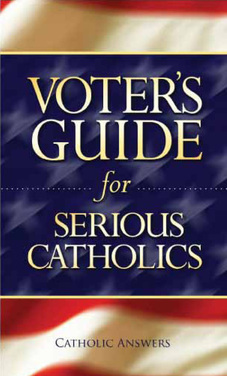Voting as a Catholic

As Roman Catholics, authentic followers of Christ, we desire that every person come to know the truth of our Lord Jesus and, thereby, gain eternal happiness. When choosing our political leaders, we should remain faithful to our Lord Jesus and be true witnesses of His Gospel. Therefore, we strive to always foster the good for all people doing our part to build a culture of life and love where each and every person can grow in their relationship with Christ, so as to grow in His image as a child of Almighty God. Being responsible, thinking, and faithful participants in nation's political process, we defend and promote the truth as revealed by the light of both our Catholic Faith and human reason. We need to prayerful consider how we use our given power as voters to best defend, promote, and manifest more fully the Kingdom of God, a Kingdom of true freedom, justice, peace, joy, and love, for all.
Our right to vote is a gift from God that we cannot be taken for granted. As good stewards of God's gifts, it is important to participate in elections and exercise our right to vote. To help us cast our votes in accord with the truths of our Catholic Faith, we have created this webpage to help you
Our right to vote is a gift from God that we cannot be taken for granted. As good stewards of God's gifts, it is important to participate in elections and exercise our right to vote. To help us cast our votes in accord with the truths of our Catholic Faith, we have created this webpage to help you

Some Points to Think about when casting our vote
Here is a little summary of important points to consider as we decide how to exercise our power to vote in accord with the gift of our Catholic Faith:
1. Human Life is primary has the highest priority when considering how to vote. If a ballot initiative (proposition) or candidate support or promote acts that involve the direct killing of human life, such as abortion, physician-assisted suicide, embryonic stem-cell research (killing of a conceived human person in the lab), the disqualifies proposition or candidate from receiving our vote. In choosing between different candidates, if their stand on issues of lesser moral weight are in line with the Catholic teaching but they support intrinsically evil acts, we should not vote for them. The simple question to ask ourselves is – Could our vote for a particular candidate or ballot initiative be promoting or supporting an intrinsically evil act, such as abortion, even if this is not our intention? If the answer is yes, then we would not vote for that candidate or ballot initiative.
2. Catholics often face difficult choices about how to vote. This is why it is so important to vote according to a well-formed conscience that perceives the proper relationship among moral goods. A Catholic cannot vote for a candidate who favors a policy promoting an intrinsically evil act, such as abortion, euthanasia, assisted suicide, deliberately subjecting workers or the poor to subhuman living conditions, redefining marriage in ways that violate its essential meaning, or racist behavior, if the voter’s intent is to support that position. In such cases, a Catholic would be guilty of formal cooperation in grave evil. At the same time, a voter should not use a candidate’s opposition to an intrinsic evil to justify indifference or inattentiveness to other important moral issues involving human life and dignity. (United States Conference of Catholic Bishop’s Forming Consciences for Faithful Citizenship, no. 34)
3. In certain races, we may end-up in good conscience not able to vote for any of the candidates running for a particular office. What can we do in this situation where every candidate running for a particular office supports intrinsically evil acts? Article #36 of the U.S. Bishop’s document, Faithful Citizenship, says, “When all candidates hold a position that promotes an intrinsically evil act, the conscientious voter faces a dilemma. The voter may decide to take the extraordinary step of not voting for any candidate or, after careful deliberation, may decide to vote for the candidate deemed less likely to advance such a morally flawed position and more likely to pursue other authentic human goods.” In the case where all candidates support intrinsically evil acts, a person would not be neglect in their duty if they decided to not vote for any of the candidates or, if possible, wrote-in a different candidate. However, the Bishops do point out that a person could be morally justified in choosing the candidate who is judged to be “less likely” to push or promote an intrinsically evil act as compared with the other candidates. As one Catholic Voter Guide explains, “we are to choose the best option, the one that promotes the greatest good and entails the least evil. Not voting may sometimes be the only moral course of action, but we must consider whether not voting actually promotes good and limits evil in a specific instance. The role of citizens and elected officials is to promote intrinsic moral values as much as possible today while continuing to work toward better candidates, laws, and programs in the future.”
4. We need to do our research. In a decision as important as choosing a person for public office, we need to be well-informed voters. This means doing own homework. Accepting whatever the news media, which has many biases, says without thinking or verifying on our own is not being well-informed. We need to carefully look at the candidates’ position on the life issues, including looking at the platform of the party the candidates represent. Finding out where the candidates stand on these particular issues can be done with an Internet search. You can look at a number of different websites and articles to get a fuller understanding of the candidates’ position. Also, look for their stand on the especially heinous “partial-birth” abortion procedure (also referred to as “late-term abortions”) and whether they support federal funds, your taxes, to be used to pay for abortions. Presently, a Federal law called the “Hyde Amendment” is supposed to prevent Federal funds to be used to pay for abortions. Candidates who support the repeal or abolishment of this law mean they support having the Government pay for abortions. As Catholics, we are obviously strongly against any public funding of abortion in any form. When candidates or party platform supports what is referred to as “Reproductive Rights” or "Reproductive freedom" or "Women's Reproductive Health" this means they will continue to allow, even actively support, abortion. Another consideration is whether candidates has shown support for organizations, such as Planned Parenthood, that promote and perform abortions or are being endorsed by such groups.
5. Watch out for being a cause of a public scandal. Our known public support of a candidate who support intrinsically evil acts, such as abortion or physician assisted suicide, can cause a scandal and lead others astray. We should ask ourselves will voting for a pro-choice candidate cause a public scandal? If others know that a Catholic is voting for a pro-choice candidate or has shown public support for that candidate, they might conclude abortion is not a grave moral evil. We should consider the moral dilemma of how the support of a candidate who is for abortion can influence the votes of others.
Here is a little summary of important points to consider as we decide how to exercise our power to vote in accord with the gift of our Catholic Faith:
1. Human Life is primary has the highest priority when considering how to vote. If a ballot initiative (proposition) or candidate support or promote acts that involve the direct killing of human life, such as abortion, physician-assisted suicide, embryonic stem-cell research (killing of a conceived human person in the lab), the disqualifies proposition or candidate from receiving our vote. In choosing between different candidates, if their stand on issues of lesser moral weight are in line with the Catholic teaching but they support intrinsically evil acts, we should not vote for them. The simple question to ask ourselves is – Could our vote for a particular candidate or ballot initiative be promoting or supporting an intrinsically evil act, such as abortion, even if this is not our intention? If the answer is yes, then we would not vote for that candidate or ballot initiative.
2. Catholics often face difficult choices about how to vote. This is why it is so important to vote according to a well-formed conscience that perceives the proper relationship among moral goods. A Catholic cannot vote for a candidate who favors a policy promoting an intrinsically evil act, such as abortion, euthanasia, assisted suicide, deliberately subjecting workers or the poor to subhuman living conditions, redefining marriage in ways that violate its essential meaning, or racist behavior, if the voter’s intent is to support that position. In such cases, a Catholic would be guilty of formal cooperation in grave evil. At the same time, a voter should not use a candidate’s opposition to an intrinsic evil to justify indifference or inattentiveness to other important moral issues involving human life and dignity. (United States Conference of Catholic Bishop’s Forming Consciences for Faithful Citizenship, no. 34)
3. In certain races, we may end-up in good conscience not able to vote for any of the candidates running for a particular office. What can we do in this situation where every candidate running for a particular office supports intrinsically evil acts? Article #36 of the U.S. Bishop’s document, Faithful Citizenship, says, “When all candidates hold a position that promotes an intrinsically evil act, the conscientious voter faces a dilemma. The voter may decide to take the extraordinary step of not voting for any candidate or, after careful deliberation, may decide to vote for the candidate deemed less likely to advance such a morally flawed position and more likely to pursue other authentic human goods.” In the case where all candidates support intrinsically evil acts, a person would not be neglect in their duty if they decided to not vote for any of the candidates or, if possible, wrote-in a different candidate. However, the Bishops do point out that a person could be morally justified in choosing the candidate who is judged to be “less likely” to push or promote an intrinsically evil act as compared with the other candidates. As one Catholic Voter Guide explains, “we are to choose the best option, the one that promotes the greatest good and entails the least evil. Not voting may sometimes be the only moral course of action, but we must consider whether not voting actually promotes good and limits evil in a specific instance. The role of citizens and elected officials is to promote intrinsic moral values as much as possible today while continuing to work toward better candidates, laws, and programs in the future.”
4. We need to do our research. In a decision as important as choosing a person for public office, we need to be well-informed voters. This means doing own homework. Accepting whatever the news media, which has many biases, says without thinking or verifying on our own is not being well-informed. We need to carefully look at the candidates’ position on the life issues, including looking at the platform of the party the candidates represent. Finding out where the candidates stand on these particular issues can be done with an Internet search. You can look at a number of different websites and articles to get a fuller understanding of the candidates’ position. Also, look for their stand on the especially heinous “partial-birth” abortion procedure (also referred to as “late-term abortions”) and whether they support federal funds, your taxes, to be used to pay for abortions. Presently, a Federal law called the “Hyde Amendment” is supposed to prevent Federal funds to be used to pay for abortions. Candidates who support the repeal or abolishment of this law mean they support having the Government pay for abortions. As Catholics, we are obviously strongly against any public funding of abortion in any form. When candidates or party platform supports what is referred to as “Reproductive Rights” or "Reproductive freedom" or "Women's Reproductive Health" this means they will continue to allow, even actively support, abortion. Another consideration is whether candidates has shown support for organizations, such as Planned Parenthood, that promote and perform abortions or are being endorsed by such groups.
5. Watch out for being a cause of a public scandal. Our known public support of a candidate who support intrinsically evil acts, such as abortion or physician assisted suicide, can cause a scandal and lead others astray. We should ask ourselves will voting for a pro-choice candidate cause a public scandal? If others know that a Catholic is voting for a pro-choice candidate or has shown public support for that candidate, they might conclude abortion is not a grave moral evil. We should consider the moral dilemma of how the support of a candidate who is for abortion can influence the votes of others.
United States Conference of Catholic Bishop (USCCB)
On the ‘Pro-Choice’ Position on Abortion
Teaching document on the political responsibility of Catholics. The US Bishops' guidance for the Catholic faithful in the exercise of their rights and duties as participants in our democracy.
Forming Consciences for Faithful Citizenship
Guía de votantes Católicos
Esta guía gratuita no le dice por quién votar; simplemente comunica el bien común para que pueda votar sin comprometer su fe y sus valores.
A message from Bishop Cotta.






